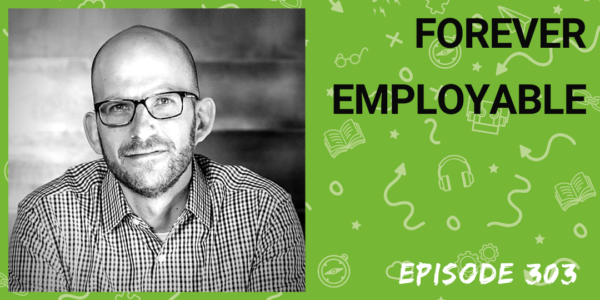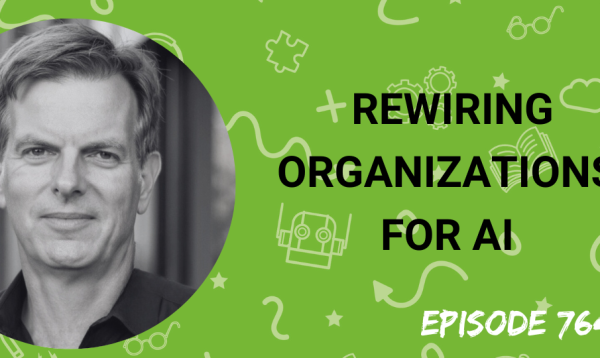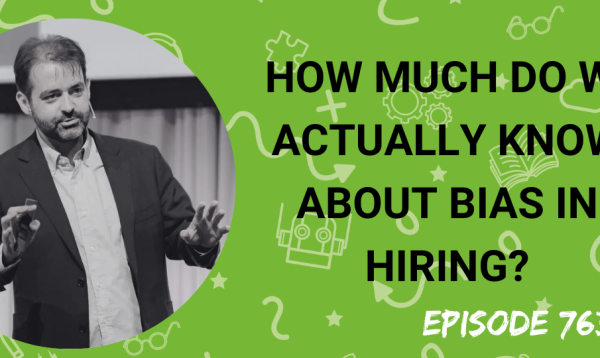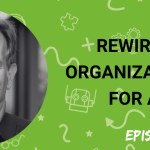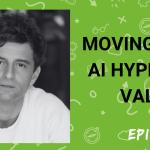Personal branding is something we’ve been talking about for at least a decade now, and it sometimes feels that much of advice that is shared is unrealistic and somewhat divorced from most people’s reality.
With the global economic crisis causing many people to rethink their long-held career plans, arguably personal branding has never been more critical, and some fresh thinking and new ideas are desperately needed.
My guest this week is consultant, author and speaker Jeff Gothelf. Jeff’s new book “Forever Employable” is fantastic and offers advice and insights on personal branding that are relevant, realistic and achievable. This interview is a must-listen for everyone in the difficult times we are currently going through.
In the interview, we discuss:
• The story behind “Forever Employable”
• Personal branding in 2020
• The end of corporate loyalty
• Creating a safety net of opportunity
• Planting your flag and building a personal platform
• Standing out from the noise via humility and vulnerability
• Are preconceived ideas about talent making employers miss out on valuable skills
• What does the future of work look like and what tools do we need
Subscribe to this podcast in Apple Podcasts
Transcription:
Matt Alder [00:00:00]:
Support for this podcast comes from Avature ats, an applicant tracking system that redefines user experience for candidates, recruiters and hiring managers. Just listen to one of the many ways in which L’Oreal USA has improved their hiring process with Avature, as told by Edward Dias, Director of Recruitment, Intelligence and Innovation.
Jeff Gothelf [00:00:25]:
Since we’ve been using Avature ATS globally, we have been able to massively improve our communication rate with candidates during and following their application. Before, over a million people worldwide would never get contacted, but with the smart automation and flexible processes, we’ve been able to change that and that’s been a huge achievement.
Matt Alder [00:00:48]:
Visit avature.net that’s a V A T U R E.net to learn why global market leaders like L’Oreal choose Avature to extend the candidate experience. From shoulder taps to first day.
Matt Alder [00:01:22]:
Hi everyone, this is Matt Alder. Welcome to episode 303 of the Recruiting Future podcast. Personal branding is something we’ve been talking about for at least a decade now and it sometimes feels that much of the advice that is shared is unrealistic and somewhat divorced from most people’s reality. With the global economic crisis causing many people to rethink their long held career plans, arguably personal branding has never been more critical and some fresh thinking and new ideas are desperately needed. My guest this week is consultant, author and speaker Jeff Gothelf. Jeff’s new book, Forever Employable is fantastic and offers advice and insights on personal branding that are relevant, realistic and achievable. This interview is a must listen for everyone in the difficult times we’re currently going through. Hi Geoff and welcome to the podcast.
Jeff Gothelf [00:02:23]:
Thanks Matt. It’s a pleasure to be here, an.
Matt Alder [00:02:25]:
Absolute pleasure to have you on the show. Could you just introduce yourself and tell us all what you do?
Jeff Gothelf [00:02:31]:
Absolutely. My name is Jeff Gothelf and these days I work as a coach and a consultant and an author and a speaker, and I work with organizations on a couple of different tracks. Primarily, I work with companies to help them build great products and to help the leadership of those organizations build the culture that builds great products. And in recent months what I’ve done is I’ve taken the learnings that I’ve gained in 20 plus years of doing digital product development and put them down in a book called Forever Employable that takes very similar approaches to digital product development, but applies them to your personal growth, your career, and your professional development.
Matt Alder [00:03:12]:
Now I’ve read the book and it really is excellent. Could you give us a bit of a background to your story and what really motivated you to write her?
Jeff Gothelf [00:03:22]:
So I turned 35 on January 31, 2008. So now you know exactly how old I am. And on the morning of my 35th birthday, I had a bit of a panic attack. And it was unclear to me initially why, because up until that point, things were good in my life and certainly my professional life, my personal life. I was 10 years into my career, roughly. I was leading a design team at a high growth startup in New York City. Married. I was married, still married, by the way. It always sounds like in past tense, like I’m no longer married, still married. Two kids. Today they’re teenagers, you know, house two cars in the suburbs, the whole, the American dream, as they like to say. And I had this panic attack. And the panic attack I realized later was about my future viability as, as an employee, what, what could I offer that would keep me forever employable? And I was genuinely concerned that very, very quickly I was going to outgrow the available on the market and the kinds of salary requirements that I really wanted and needed to maintain for my family. And I panicked. And on that day, I made a fundamental decision, resolution, really, that changed my life, which was I was going to stop looking for jobs, I was going to stop looking for work, which feels unintuitive, right? But I was actually going to do the opposite. I was going to create a situation where work finds me, where opportunities find me, find me. And I’ve spent the last 12 years building that reality through building a platform of thought, leadership and recognized expertise. And as the success of that has grown, I’ve been getting a continuous stream of inbound requests to share how I did that. And so eventually, after a couple of years of getting these requests on an almost weekly basis, I decided to put it down in a book. And that’s where Forever Employable came from.
Matt Alder [00:05:20]:
Fantastic stuff. Now, we’ve all been talking about personal branding for quite some time now, and when I read your book, that was the, that was the kind of the filter that I suppose that I took into it. But I think what’s interesting is you speak to this topic in a way that’s really relevant for the times that we live in. And you’re not telling people that they have to hustle and go out and start their own business and effectively make massive changes in terms of what they’re doing. Talk us through your model, talk us through your approach.
Jeff Gothelf [00:05:48]:
So the world that we live in is filled with turmoil and, and a lot of unprecedented, unexpected realities that we’re all living through now. And we have for the last, really for the last 20 years. And that pace of change and that pace of turmoil is only picking up. And the thing that is unfortunately been a casualty of that certainly over the last couple of decades or more is corporate loyalty. There’s. There is no corporate loyalty. When times get tough, if they decide that you’re redundant, then you’re redundant, and that’s the end of it. What I needed to be able to guarantee for myself and what I’ve put down in the book is how to create a safety net that ensures that no matter what happens in the world, you’ve got a steady stream of opportunities coming into you. So that when the next merger or acquisition or layoff or regulatory constraint comes into place and you get squeezed out, out of your current opportunity, there’s no panic. And the formula in the book is it’s my story. So it’s the five steps that I took to get there. And I recognize that those five steps aren’t going to work for everybody, but I’ll go through each one of them very, very quickly now, and we can dig deep into each one of them if you’d like a little bit later. But there’s five steps. The first step is called Plant yout Flag. Plant your flag is deciding where you’re going to build your brand on top of, what slice of expertise, experience, domain you’re going to build your flag on top of. And really kind of really trying to balance both making it broad enough and specific enough so that you have a unique positioning in the marketplace. And that comes through trial and error, experimentation and learning. The second step is called telling your story. So once you’ve identified what your flag is going to be, well, now you’ve got to start telling that story and really discover what the best channels are and the best formats and the best way to reach your target audience. So you’ve decided that you’re going to reach a certain target audience. Audience. Where do they consume this kind of content? What format do they prefer? They like blog posts? Do they like tweets? Do they like LinkedIn? Do they like YouTube? Do they like Discord? Right. It could be a variety of anything. But you’re practicing telling your story, and as you tell it, the audience grows. Now, what happens as the audience grows is step number three, which is called following the New paths. And this is where it gets really interesting and really scary because if you start to get successful with this, new opportunities start to come in, which is the whole goal of this. And you’ve got to decide which of those opportunities you’re going to take. And in some of those situations, that’s going to mean leaving behind the things that you’re very comfortable doing and participating in right now. Like a full time job, for example, or your current full time job for another full time job. But as you embrace these new paths, that begins to grow and better opportunities come and then better opportunities come. So you’ve planted your flag, you’re telling your story, you’re following these new paths. And where I find myself for step number four is teaching. Now, teaching is interesting because it’s an extension of storytelling and it’s not somewhere I ever saw myself actually being. Fifteen years ago, if you would have asked me on the morning of my 35th birthday if I saw myself being a teacher in 12 years, I would have thought that was ridiculous. But it turns out that by building this platform and by sharing my expertise, I’m teaching. And every single opportunity that I have to teach folks what I know makes me better at the craft, it makes me better at storytelling, and it builds up that platform and it generates more opportunity. And then the fifth and final step in all of this, and it’s the one that took me forever to learn, really the last thing that I learned, and I still struggle with it today, is give it all away. Now, I’ve been working professionally for over 20 years. I have experience, I have expertise. I believe I should be paid for that experience and that expertise. And yet, unintuitively, the more I give back to my community, to the people who pay attention, to my readers and to my subscribers, the more that I share back with the industry, the more opportunities come back to me. And so if you go to my website, for example, you’ll find a significant amount of free content, both in video format, in audio format, and blog posts, resources, downloads, everything is free on my site except the books that I’ve written and the courses that I sell. And I find that to be the most effective way to grow that audience and to drive those inbound opportunities. So those are five steps in the process.
Matt Alder [00:10:30]:
Now, in the spirit of number number five, I’d love to dive deeper into, into, into all of those in a way that’s really going to kind of help people. But obviously we are bound by time. So a lot of people listening in the talent acquisition community may be transitioning between jobs or they may be worried about their career or worried about their current position with all of the, the uncertainty that’s going on in the world in 2020. Just to kind of, I suppose, dig a little bit deeper into the first couple of steps of, of this. What would, what should people be doing first? How do they make this happen?
Jeff Gothelf [00:11:10]:
Yeah, so start at the beginning. As they say, the first step is planting your flag, and it’s really deciding where to plant your flag. And there are going to be potentially multiple places for you to do that. So, for example, for me, when I set out to plant my flag, my expertise at the time was digital design, and specifically digital design in an agile software development world, which was a big challenge back in 2008. It’s still a big challenge today, and that was likely where I was headed, but it wasn’t. The only thing that I had experience or expertise in. One of my personal passions is vintage electric pianos. I have a kind of a ridiculous. If you know the character Cliff Clavin from Cheers, now I’m dating myself again, but I have that level of knowledge about vintage electric pianos. I used to have a big collection of them for a long time, and that was something that I considered. It was one of the things that I places I considered planting my flag. One of the things I did next was I began to run experiments to test whether or not these were viable directions to go in by blogging a little bit, tweeting a little bit, posting in some forums, sharing some feedback. And it became very clear to me very, very quickly that working on software, digital design and software development had a far bigger target market, had far greater interest, far greater potential for becoming the base, the foundation for the platform that I was building for myself. And so that was. That’s. That’s where I started. Now in the book, I talk about asking yourself a series of questions that will help you identify these passions and these expertises and global trends and target audience size and that type of thing. What’s happened since the publication of the book is I’ve been had my attention called to a Japanese concept called ikigai. I K I G A I ikigai. And basically ikigai is a Japanese concept that means your reason for being. It’s the reason you get up out of bed every morning and it forces you to answer four questions. And the questions are, what are you good at? What do you love? What does the world need? And what can you get paid for? And as you work your way through answering those questions, when you find the things that tick all four boxes, those are really great places to test. Planting your Flag. And that’s a great place to start.
Matt Alder [00:13:56]:
Just, I suppose, digging into the second part of this in terms of telling your story. I mean, obviously very interested in. In terms of your view of what that looks like. But I suppose a specific question around it would be there is, you know, so much digital noise out there in terms of people telling their story and publishing videos and writing blog posts and creating podcasts and all those. All those kind of things. How do people stand out from all of that background noise and get. Get attention?
Jeff Gothelf [00:14:25]:
I think there’s. There’s two concrete qualities to your story that will help you resonate and stand above, and their authenticity and humility. And to me, those are the six the people that you see succeed in rising above the noise. And you’re right, Matt, there’s a ton of noise out there. The people who succeed are telling their story authentically and in a humble way. Now, what do I mean by that? Authenticity is a connection that you make with your audience based on your actual experience. The people who connect the most with their audience are the people who have had experience with the subject matter that they are discussing. They’re not necessarily talking about it from an academic or a hypothetical standpoint, but they’re in it. They’re in it every day. They’ve been in it. And so they’ve got that real world experience, and that comes across when they start telling their story. Right. When I was doing, you know, when I was leading my design team in this reality, these were the challenges that I faced. And that. That immediately hits home because they say, well, that guy Jeff, he did this, right? He’s not just making this stuff up. And if it worked for him, maybe I should try it. Humility is the other side of the coin. And this is a really. This is a tough one for folks because humility means vulnerability as well. And humility basically says that you’re going to share your experiences and your expertise authentically, regardless of the outcome. So, hey, we had this brilliant idea and we tried running the team this way, and it failed miserably. It fell on its face and it was a disaster. And we lost a month’s worth of work, and my boss yelled at me and it was awful. But what I learned from that was X, Y and Z in the hopes that you don’t have to repeat my mistake, right? So we share the wins and we share the losses and between authenticity and humility, because, again, there’s this vulnerability there. That’s where the connections are made with your target audience. And the more that you can be honest and open about that, the better it works. And again, this is something that I learned over time and I still struggled with because with Forever Employable is. It’s the most vulnerable and the most personal I’ve been in any of the books that I’ve written. It’s my fourth book. I’ve written design books and business books, but this is the most personal I’ve been. And that’s what people are resonating with. And it’s surprised me to no end. So that’s where I think you focus.
Matt Alder [00:17:02]:
I mean, that makes perfect sense. And I think when I was reading the book, the real thing that drags you into it is your story and the realization that you had that even though your career was incredibly successful, it was, it was in trouble from the, from the, from the future. So, you know, that makes, that makes a lot of sense. Just a question to sort of frame this a little bit in terms of corporate talent acquisition. So do you think that companies are missing out on valuable skills and valuable people joining their business because of the way that they, they think about.
Jeff Gothelf [00:17:40]:
Yeah. So I think, I think we really need to redefine what we perceive as talent and experience these days. Right there’s. And again, look, I come at this as somebody who has been on the job hunt many, many, many times in my life and on the hiring side of things many times in my life. And having worked in the jobs industry when I was at the Ladders in New York, so having a lot of experience with a talent acquisition, HR and talent management folks, there is this perception that, look, I’m going to read your cv, I’m going to read your resume, and it’s going to provide me with everything I need to know to make a decision about whether or not to bring you in. I think today there’s so much more to people than their CV or their resume. And it’s available online. For better or for worse, it’s there. And I think looking more broadly and with a more open perspective on what makes somebody viable and potentially a good fit for the organization requires looking at their whole self. It requires looking not just at their professional accomplishments, but are they giving back to the community? Are they sharing? Are they teaching? Are they learning? Do you. You know, because if they’re participating in public conversations, you can get a sense of their humility or their lack or lack thereof. And I think that that begins to really paint a much bigger, better picture of who this person is. Now there’s going to be, I think, some hesitation, especially with somebody who’s particularly well known online or has a following that they might come in and have an ego or an expectation that reflects their online presence. And I disagree with that. I think that ultimately what that, what that brings to the organization is the positive halo of that following and of the, of the subscribers and the, you know, the platform that this person has built. Because now those people are going to be paying attention to your company and that person is now drawing attention to your company as somewhere they’re going to work, which is inevitably going to attract other high quality applicants to the same place.
Matt Alder [00:19:50]:
So as a follow on question from that 2020 has taught us that making predictions about, about the future is just ridiculous because we really don’t. You don’t know what’s going to happen, but I’m going to ask you to do that anyway. What’s your best guess about what the future of work might look like? How are companies going to be sort of interfacing with talent? How are people going to be doing work in the future?
Jeff Gothelf [00:20:18]:
So the reality that we face today I don’t think is the end state for the future of work. And I certainly don’t hope so. I anticipate that we will go back to physical spaces of work inevitably. I think that people want to and I think that ultimately there are benefits to seeing your colleagues and being face to face and developing those camaraderies and those relationships. I do believe, however, that we have jumped ahead a decade or more into the acceptance and the reality of distributed teams, remote work, remote collaboration and tools. Now, currently, what we’re doing is the same thing we always do with technology, is that we are replicating the physical world with digital technology. And you saw this with the Web. When Web 1.0 first came out in the late 90s, we took paper brochures and we made HTML brochures out of websites that looked exactly the same. And then we recognized that there was a lot more power and a lot more opportunity to redefine how we do business and how we communicate and how we entertain. And that’s what’s happened over the last 20 years. I think what we’re seeing right now is a bit of a panicked, hurried attempt to recreate the office environment as quickly as we can. And what’s going to happen as we progress hopefully away from the pandemic based realities that we live in right now and get back to some kind of a hybrid, remote, distributed and in person reality, the tools that we will have at our disposal are going to become far more powerful, far more flexible and enable different kinds of collaboration and communication that we don’t really, we can’t really imagine just yet. Just to make this super concrete, because I feel like I’ve been talking in the abstract. Many of the collaboration tools we use today mimic the whiteboard at the office. You’ve got a whiteboard, we’ve got markers, we’ve got post it notes, right? And we gather around the whiteboard and people participate in brainstorming exercises and move things around. And that’s roughly been the, the metaphor for digital collaboration spaces. Inevitably, that’s going to change. Inevitably we’re going to start to utilize that technology to redefine remote collaboration. That’s kind of the next wave of things. And I’m really looking forward to it because right now I think that that simply recreating the physical world in the digital world is good enough to get the job done, but definitely not the future of work.
Matt Alder [00:22:55]:
So final question. Where can people find you and where can they buy the book?
Jeff Gothelf [00:23:00]:
So I’m super easy to find. That’s by design. If you go to jeffgoth.com, everything you need to know is right there. The book Forever Employable is available pretty much anywhere you buy books, Amazon, obviously, Apple Books anywhere. But Amazon’s a great place to buy it and foreveremployable.com is the book’s website and that’ll get you everything you need to know as well.
Matt Alder [00:23:21]:
Jeff, thank you very much for talking to me.
Jeff Gothelf [00:23:23]:
My pleasure, Matt. Thanks so much for having me.
Matt Alder [00:23:25]:
My thanks to Jeff Got Health. You can subscribe to this podcast in Apple Podcasts, on Spotify or via your podcasting app of choice. Please also follow the show on Instagram. You can find us by searching for recruiting future. You can search through all the past episodes@www.recruitingfuture.com on that site. You can also subscribe to the mailing list to get the inside track about everything that’s coming up on the show. Thanks very much for listening. I’ll be back next time and I hope you’ll join me.

